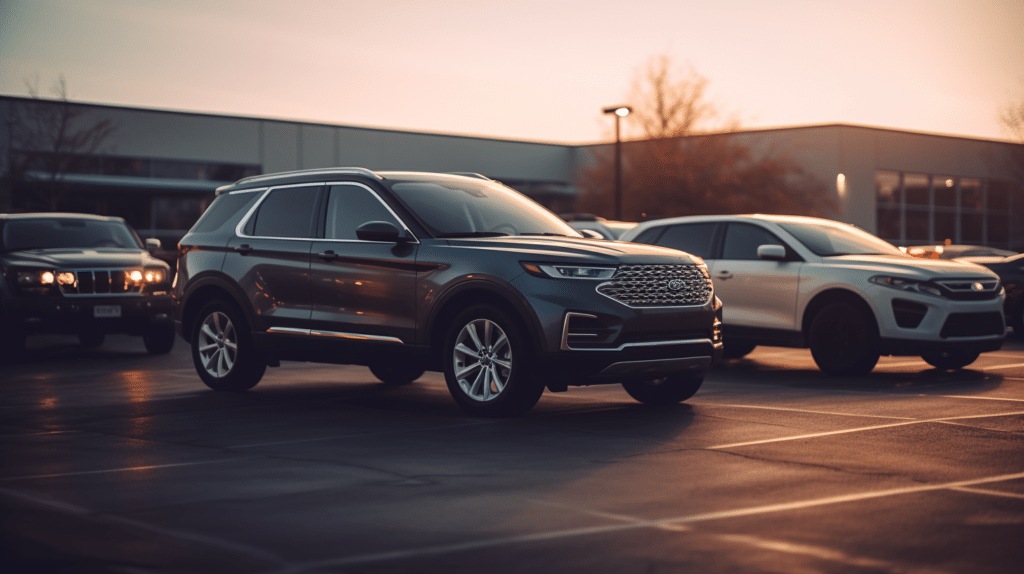Choosing the right vehicle can be a tough decision, especially with so many options available in the market. When it comes to passenger cars, SUVs and sedans are two popular choices that offer distinct features and benefits. It can be a daunting task to evaluate the differences between these two car types, as both have their strengths and weaknesses.
In this article, I will provide a comprehensive comparison between SUVs and sedans, highlighting their unique characteristics and helping you make an informed decision about which one is right for you. We will explore the pros and cons of each vehicle type and analyze factors such as fuel efficiency, cargo space, safety features, performance, price, reliability, and resale value.
Key Takeaways:
- SUVs and sedans are two popular passenger car types that offer distinct features and benefits.
- Choosing between an SUV and sedan can be tough, as both have their strengths and weaknesses.
- To make an informed decision about which one is right for you, it is important to evaluate factors such as fuel efficiency, cargo space, safety features, performance, price, reliability, and resale value.
- By comparing SUVs and sedans in detail, we aim to help you make an informed decision about which type of vehicle aligns best with your needs and preferences.
Pros and Cons of SUVs and Sedans
When it comes to choosing between an SUV and a sedan, there are many factors to consider. Here, I will discuss the pros and cons of each vehicle type.
Advantages of SUVs
SUVs typically have more space for passengers and cargo than sedans. This makes them a popular choice for families or individuals who need to transport large items. SUVs also tend to have a higher ground clearance, making them better for off-road driving or in areas with inclement weather. Additionally, many SUVs come equipped with all-wheel drive, providing better traction on slippery roads.
Another advantage of SUVs is their perceived sense of safety. Many consumers feel more secure in an SUV due to their larger size and weight, which can provide a buffer in the event of a collision. Additionally, SUVs tend to offer better visibility, with a higher driving position and larger windows.
Disadvantages of SUVs
One of the biggest drawbacks of SUVs is their poor fuel economy. Due to their larger engines and heavier weight, SUVs typically require more fuel to operate than sedans. This can add up to significant costs over time, especially for those who drive frequently.
Another disadvantage of SUVs is their higher price tag. SUVs tend to be more expensive upfront than sedans, and they often come with higher maintenance and repair costs. Additionally, SUVs may be more difficult to find parking for in urban areas due to their larger size.
Advantages of Sedans
Sedans are known for their fuel efficiency, making them a popular choice for those who want to save on gas costs. Additionally, sedans are generally more affordable than SUVs, with a lower price point upfront and lower maintenance costs over time.
Another advantage of sedans is their handling and performance. Due to their lower weight and center of gravity, sedans tend to offer more precise handling and a smoother ride than SUVs. Sedans are also easier to park and maneuver in tight spaces, making them a better choice for city driving.
Disadvantages of Sedans
One of the biggest disadvantages of sedans is their limited space. Sedans typically have less room for passengers and cargo than SUVs, which can make them challenging for families or those who frequently transport large items. Additionally, sedans do not offer the same level of off-road capability as SUVs, which can limit their usefulness in certain situations.
Another potential drawback of sedans is their perceived lack of safety. Sedans may not offer the same level of visibility or sense of security as SUVs, which can make some consumers hesitant to choose them.
Conclusion
Ultimately, the decision between an SUV and a sedan depends on a variety of factors, including individual preferences and needs. While SUVs offer more space, a perceived sense of safety, and off-road capability, they come with higher costs and fuel inefficiency. Sedans, on the other hand, offer better fuel economy, handling, and affordability, but may not have enough space or perceived safety for some consumers.
Fuel Efficiency, Cargo Space, and Safety Features
One of the most important considerations for car buyers is fuel efficiency, as it directly impacts the cost of ownership and the impact on the environment. Sedans are generally more fuel-efficient than SUVs, due to their lighter weight, aerodynamic designs, and smaller engines. According to the EPA, the average fuel economy for a sedan is around 30 mpg, while the average for an SUV is around 20 mpg. However, hybrid and electric SUVs are becoming increasingly popular, as they offer better fuel efficiency and lower emissions.
Cargo space is another factor that can greatly influence a car buyer’s decision. SUVs are known for their larger cargo capacity, as they have more headroom and legroom, and often feature foldable rear seats for additional storage. Sedans, on the other hand, have smaller trunks and limited cargo space, which can be a drawback for those who frequently transport large items.
Safety features are a critical aspect of any vehicle, and both SUVs and sedans offer various safety technologies to protect passengers. SUVs tend to have a higher driving position, which can provide better visibility and a sense of security for drivers. Additionally, many SUVs come equipped with all-wheel drive, which provides better traction and stability on slippery roads. Sedans, on the other hand, are generally more maneuverable and easier to handle, which can be an advantage in crowded city streets.
| SUV | Sedan | |
|---|---|---|
| Fuel Efficiency | Lower | Higher |
| Cargo Space | Larger | Smaller |
| Safety Features | Higher driving position, all-wheel drive | Maneuverability |
Performance, Price, Reliability, and Resale Value
When it comes to performance, SUVs generally have the upper hand over sedans. With more powerful engines and higher ground clearance, SUVs provide better off-road capabilities and towing capacities. However, sedans are often more fuel-efficient than SUVs, which can result in lower maintenance costs over time.
On the other hand, price is where sedans have the edge. Sedans are typically less expensive than SUVs, both in terms of initial purchase price and ongoing maintenance costs. Additionally, sedans often have better reliability ratings than SUVs, which can save buyers money on repairs and maintenance in the long run.
Resale value is another factor that car buyers should consider when deciding between SUVs and sedans. While SUVs tend to hold their value better than sedans, this can vary depending on the make and model of the vehicle. Some SUVs may experience higher depreciation rates, which can result in a lower resale value.
| SUVs | Sedans | |
|---|---|---|
| Performance | Powerful engines, better off-road capabilities and towing capacities | More fuel-efficient |
| Price | More expensive than sedans, higher ongoing maintenance costs | Less expensive than SUVs, lower ongoing maintenance costs |
| Reliability | May have lower reliability ratings than sedans, higher repair and maintenance costs | Often have better reliability ratings than SUVs, lower repair and maintenance costs |
| Resale Value | Tend to hold their value better than sedans, but can vary depending on make and model | May have lower resale value than SUVs, but can vary depending on make and model |
Ultimately, the decision between an SUV and a sedan comes down to individual preferences and needs. Car buyers should consider factors such as performance, price, reliability, and resale value when making their decision. By carefully weighing these factors, car buyers can choose the vehicle that will best suit their lifestyle and budget.
Conclusion
After examining the differences between SUVs and sedans, it is clear that both vehicle types have their advantages and disadvantages.
In terms of fuel efficiency, sedans tend to have the edge over SUVs due to their lighter weight and more aerodynamic design. However, SUVs can offer greater cargo space and often come equipped with more advanced safety features.
When it comes to performance and price, it largely depends on the specific make and model. In general, sedans tend to offer better handling and acceleration, while SUVs are better suited for off-road driving and inclement weather.
Reliability and resale value are also important considerations for car buyers. Sedans typically have a higher resale value and may be more reliable, but SUVs often come with longer warranties and more robust mechanical components.
Ultimately, the choice between an SUV and a sedan comes down to individual preferences and needs. If you frequently transport large items or require more space for passengers, an SUV may be the better option. If you prioritize fuel efficiency and a smoother driving experience, a sedan might be the way to go.
By carefully weighing the pros and cons of both vehicle types, car buyers can make an informed decision that meets their unique needs. Whether you choose an SUV or a sedan, the key is to select a vehicle that provides the features, performance, and reliability you require for a comfortable and safe driving experience.
FAQ
Q: What is the difference between an SUV and a sedan?
A: SUVs are larger, generally have higher ground clearance, and provide more interior space and cargo capacity compared to sedans. Sedans are smaller, lower to the ground, and typically offer better fuel efficiency.
Q: Are SUVs safer than sedans?
A: SUVs generally have a higher safety rating due to their larger size and higher seating position, which provides better visibility. However, newer sedan models also come equipped with advanced safety features, making them equally safe options.
Q: Which vehicle type is more fuel-efficient?
A: Sedans are generally more fuel-efficient than SUVs due to their lighter weight and aerodynamic design. However, advancements in technology have led to the development of fuel-efficient SUV models as well.
Q: Can SUVs accommodate more passengers than sedans?
A: Yes, SUVs usually have a larger seating capacity, ranging from 5 to 9 passengers, whereas sedans typically seat up to 5 people.
Q: What factors should I consider when choosing between an SUV and a sedan?
A: It depends on your specific needs and preferences. Consider factors such as your desired cargo space, passenger capacity, fuel efficiency, safety features, driving terrain, and budget.
Q: Are SUVs more expensive than sedans?
A: SUVs tend to have a higher initial purchase price compared to sedans due to their larger size and additional features. However, it’s important to consider long-term costs such as fuel economy and maintenance.
Q: Do SUVs have better resale value than sedans?
A: SUVs generally have a higher resale value compared to sedans. However, resale value can vary depending on factors such as brand reputation, model popularity, condition, and demand in the used car market.




